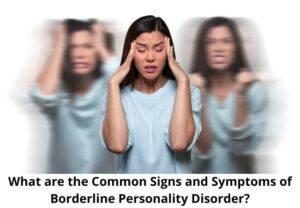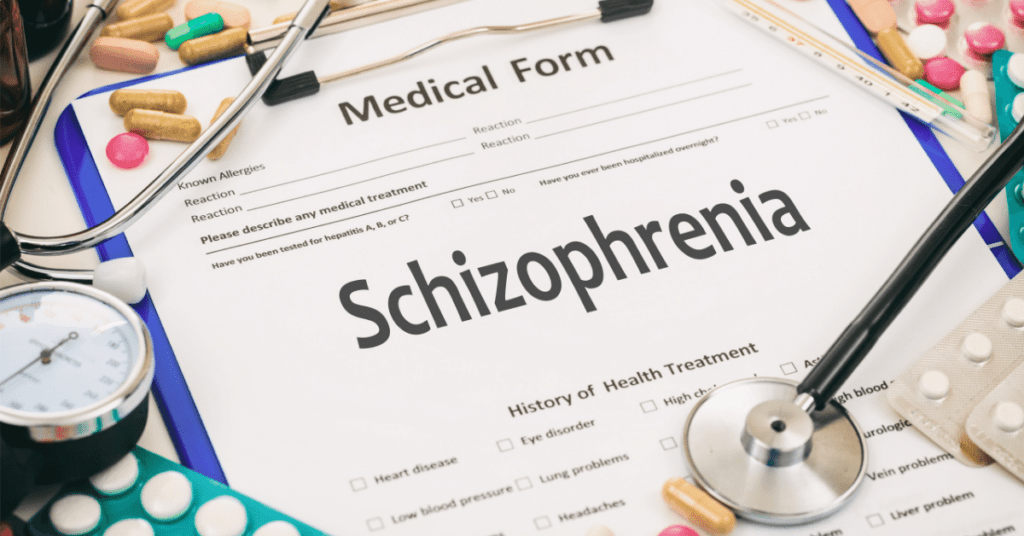Borderline schizophrenia is a mental illness that affects the individual’s ability to recognize what is real and unreal. People with this condition show symptoms like hallucinations, delusions, and disordered thoughts.
Contents
- 1 What Is Borderline Schizophrenia?
- 2 Symptoms Of Borderline Schizophrenia
- 3 How Is Borderline Schizophrenia Treated?
- 4 Treatment for Borderline Schizophrenia
- 5 Living with Borderline Schizophrenia
- 6 Schizophrenia And Borderline Personality Disorder
- 7 Symptoms Of Borderline Personality Disorder
- 8 How Schizophrenia And BPD Differs?
- 9 Conclusion
What Is Borderline Schizophrenia?

Borderline schizophrenia is a mental illness that is characterized by unstable moods, thoughts, and behavior. It is a type of schizophrenia that is less severe than other types of the disorder. People with borderline schizophrenia may experience psychotic symptoms, such as hallucinations and delusions, for a short period of time. These symptoms may last for a few hours or days. The person might feel really good one minute and really bad the next.
They may believe others are reading their minds or plotting against them and may hear voices commenting on their behavior. These symptoms can be frightening and can lead to suicide attempts. Borderline schizophrenia is treated with medications that help the person get better by reducing the psychotic symptoms of the disorder.
Symptoms Of Borderline Schizophrenia
 According to the Diagnostic and Statistical Manual of Mental Disorders (DSM-5), there are seven main symptoms for diagnosing borderline schizophrenia.
According to the Diagnostic and Statistical Manual of Mental Disorders (DSM-5), there are seven main symptoms for diagnosing borderline schizophrenia.
• Hallucinations: These are seeing or hearing things that do not exist. This is the most common symptom, but may not be seen in young children. To be considered hallucinations, these events must last at least one minute and cannot be due to medical conditions like drug use or seizures.
• Delusions: These are thoughts that come from within but feel as if they came from external forces like aliens or people plotting against them. The person with this disorder might believe that their food has been poisoned or that a chip has been implanted into their brain.
• Disordered thoughts: This includes racing thoughts, thinking that two or more things are happening at the same time (called “co-consciousness”), and not being able to focus on one thing for a long period of time.
• Mood swings: These can be really intense and often last for a few hours or days. The person might feel really good one minute and really bad the next.
• Suicidal thoughts or behaviors: Around 50% of people with borderline schizophrenia will attempt suicide at some point in their lives.
• Social isolation: People with this disorder may stop talking to friends and family, withdraw from social activities, or feel like they are longer part of the world.
The individual may believe others are reading their minds or plotting against them and may hear voices commenting on their behavior. Someone with this condition may act impulsively without regard to the consequences; they may engage in substance abuse to mask the symptoms of this disease.
How Is Borderline Schizophrenia Treated?
Borderline schizophrenia is usually treated with medications called antipsychotics. These help to reduce the psychotic symptoms of the disorder. The type of medication will be based on the person’s individual needs. Some people also need therapy to help them deal with their thoughts and emotions. This might include cognitive-behavioral therapy (CBT) or family-focused therapy.
Treatment for Borderline Schizophrenia

The main treatment for borderline schizophrenia is medications that help the person get better by reducing the psychotic symptoms of the disorder.
Medication
Medications used to treat this condition include antidepressants, antipsychotics, and mood stabilizers. A doctor may prescribe these in combination or separately, depending on the individual’s symptoms. Treatment also includes psychotherapy, which helps the person to deal with the emotional aspects of this illness.
Medication-related side effects can include weight gain, movement problems like muscle tremors, and sexual dysfunction. Antipsychotics may also cause sedation (feeling sleepy), which is usually helpful for this condition. However, it can be a problem if the person needs to be alert for work or school. The doctor may need to adjust the dose or change the medication if this occurs.
Psychotherapy
Psychotherapy treatments that have been found helpful for borderline schizophrenia include cognitive-behavioral therapy (CBT) and family-focused therapy. CBT helps the person to understand how their thoughts and feelings influence their behavior. It also teaches them coping skills to deal with difficult situations. Family-focused therapy helps the family understand and support the person with this disorder. It also teaches them how to better communicate with their loved ones.
The prognosis for borderline schizophrenia
The prognosis of borderline schizophrenia is good if the person follows his or her treatment plan and takes medications as prescribed. The symptoms will fade with treatment and by staying on track with their doctor’s recommendations.
Living with Borderline Schizophrenia

It can be really tough living with borderline schizophrenia. Not only do you have to deal with the mental illness, but you also have to deal with the stigma that comes along with it. Many people see it as a “bad” mental illness and think that those who have it are crazy. They also see it as untreatable, but that is not true. Medication and therapy can reduce many of its symptoms.
Borderline schizophrenia can be a frightening disorder that affects the way a person thinks, feels, and behaves. The symptoms can be difficult to live with and may lead to suicide attempts. The person should seek professional help for this disease so that he or she can learn how to manage his or her condition.
Resources and Support for those living with Borderline Schizophrenia:
The National Alliance on Mental Illness (NAMI) is a wonderful resource for providing support to those living with mental illness, including borderline schizophrenia. NAMI offers education and support programs to help people cope with their condition. They also provide information on treatments and medications.
Schizophrenia And Borderline Personality Disorder
Schizophrenia and borderline personality disorder are two extremely different types of mental disorders. Borderline schizophrenia is a type of schizophrenia that features the same symptoms that other people with this illness face: psychosis and auditory and visual hallucinations. Even though they may share some things in common, they are very different because the motivating force behind the illness is different. BPD has to do with emotions and relationships whereas schizophrenia usually has more to do with thoughts and let’s not forget about the fact that schizophrenics usually need professional help, while it is possible for someone with BPD to function without treatment.
Given the similarities between the two, it’s important to know the symptoms of Borderline personality disorder
Symptoms Of Borderline Personality Disorder
 A borderline personality disorder is a mental disorder characterized by an inability to manage emotions and relationships. The symptoms of this illness include changing moods, difficulty maintaining personal relationships, impulsive behavior, and reckless disregard for safety. The patient may also experience paranoid thoughts and feel persistently empty or bored.
A borderline personality disorder is a mental disorder characterized by an inability to manage emotions and relationships. The symptoms of this illness include changing moods, difficulty maintaining personal relationships, impulsive behavior, and reckless disregard for safety. The patient may also experience paranoid thoughts and feel persistently empty or bored.
One of the main symptoms of Borderline personality disorder is impulsivity. Impulsivity is acting without thinking about the consequences first. Some individuals with this condition engage in self-destructive behavior such as drugs addiction and eating disorders. They may also engage in risky sexual activity or spend money excessively which can lead to financial problems.
A person with Borderline personality disorder may experience intense anger at those who are closest to them. This anger can be directed towards family members, friends, or even complete strangers. The person may also feel intense love and then hate for the same person. These intense emotions can be very difficult to manage and may lead to chaotic relationships.
Another common symptom of Borderline personality disorder is feeling empty or bored. This occurs when the person feels that their life has no purpose or meaning. They may feel like they are just going through the motions without any real sense of joy or happiness.
This emptiness can often lead to a state of depression.
If you think you or someone you know may have Borderline personality disorder, it’s important to seek professional help. There are treatments available that can help manage the symptoms of this condition.
How Schizophrenia And BPD Differs?
While schizophrenia and borderline personality disorder are two different types of mental disorders, they share some similarities. Both conditions can cause psychosis and auditory and visual hallucinations. Schizophrenics usually need professional help, while it is possible for someone with BPD to function without treatment.
The main difference between the two is the motivating force behind the illness. Schizophrenia is usually due to a biochemical imbalance in the brain, while BPD has to do with emotions and relationships. This means that the symptoms of these two disorders can be very different.
Conclusion
If you have borderline schizophrenia disorder, the best way to manage your symptoms is by taking medications. Or if you feel like you may be showing signs of it, see a mental health professional for diagnosis and treatment options. It’s important that people who suffer through these episodes get a check-up and treatment. So they can live happy, healthy lives. If left untreated or ignored, there is no telling what might happen in someone’s mind if they don’t take care of themselves medically and psychologically.
If you are looking for affordable Online Counseling MantraCare can help: Book a trial therapy session


